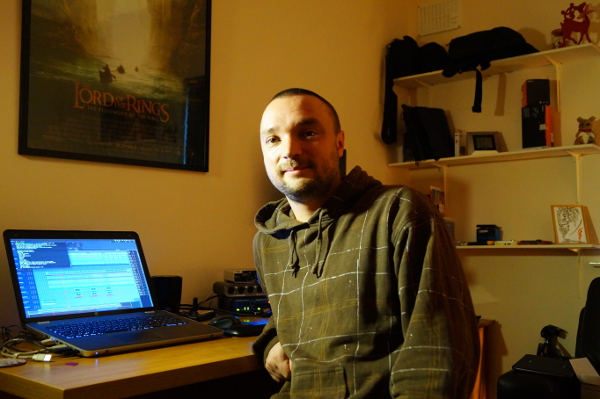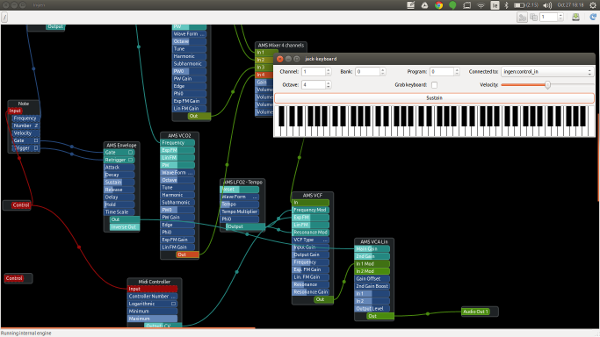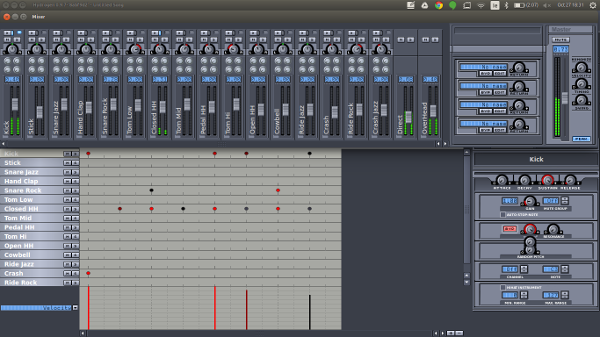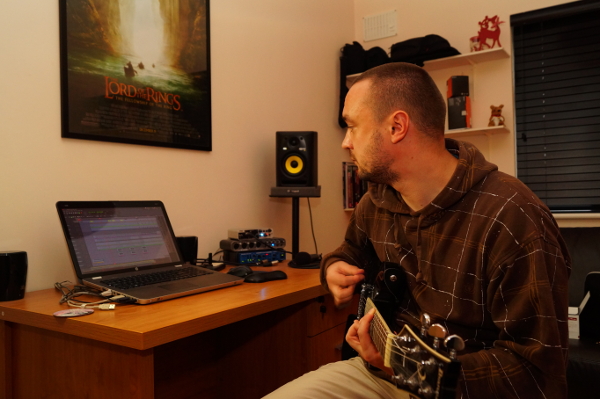
In this interview we talk to Aurélien Leblond of one man band, A Violent Whisper. Aurélien has ported Alsa Modular Synth modules over to the LV2 plugin format. He has also been hacking away on adding new features to Hydrogen.

Hi Aurélien, where do you live, and what do you do for a living?
I'm a French living in Galway, on the west coast of Ireland. Galway is a very interesting city to live in, full of artists, right at the door of Connemara.
I work as software engineer and project manager for SAP.
What is your musical background?
My parents pushed me to play music when I was very young, around 6 or 7. I started in a classical music school where I learned to play percussion (classical snare, timpani, xylophone, etc.). In my teenage years, I discovered rock and metal music and turned to the drums. Finally for the past 4-5 years I started to teach myself the guitar and keyboard and formed the "one-man-band",
A Violent Whisper.
As I mentioned, my first real music interest was with metal music: Sepultura, Slayer, Pantera, and maybe not as metal but still "loud rock" Nirvana. Over the past few years I started to dial down the volume and go for more rock and electro-rock - Radiohead, Pink Floyd, Autolux, Queens of the Stone Age, Led Zeppelin... But to be honest I have quite eclectic taste, and I would listen to anything as long as it's good music I enjoy! For example, I got to see Death Grips last year in Dublin and that might have been one of the best concerts I ever got to be at!
But most probably Nine Inch Nails has been my biggest musical influence.
What is your history with Linux?
When I started to study at IUT Le Havre back in France, I only knew of Windows, but this university was all about Linux. Operating Systems were taught through Linux, the coding environment where I learned C was Unix Solaris... If I remember well we even had a full course on Shell. I barely remember using Windows during those 2 years. But on top of that, teachers were explaining what Open Source really meant, and this idea of sharing and working together really resonated with me.
After that I guess the path is very similar to the one followed by many others. I installed a dual boot, realised as a poor student that all those tools available free "as free beer" were quite handy, and one day noticed I hadn't booted on Windows for a few months...
Tell us a bit about what projects you are involved in and why you felt compelled to get involved?
The first project I got involved with was
ams-lv2 to port the Alsa Modular Synth (AMS) internal modules into LV2 plugins. My first idea was to add LV2 support into AMS, but I quickly realised with
Ingen being around, it would be easier to port AMS into LV2.
I have to admit, I started this project for pure selfish reason. Being a fan of Nine Inch Nails, I would see those guys creating crazy sounds and effects with their modular synths, that's how I got started with using them.
ams-lv2 plugins running in Ingen
While porting modules of AMS and when I saw how easy it was to create simple LV2 plugins, I started to play around with other ideas. Being a drummer, I started with plugins that mess with rhythm like
beat repeaters or beat slicers. I as well created very crude and simple effects like a down sampler or a granulator, and I had a look at those by curiosity. That's the neat thing about LV2 it is so simple that from a simple idea you want to try out, you can code a prototype in a couple of hours.
Finally, the project I'm participating in these days is
Hydrogen. I own an e-drum at home and wanted to add a few functionalities for it. First was to be able to change what hihat samples are played depending on the pressure on the hihat pedal. Second was to make Hydrogen compatible with cymbal choke.
Now that I'm more familiar with the Hydrogen code, I'm currently working on being able to have multiple banks of sounds for instruments. In a studio, sound engineers often record drums with multiple microphones (directly at the instruments, over the drums, etc.) and later on when mixing they chose how much of each mics they want... More overhead would make the drums sound further away, more direct would make it sounds "in your face"... I want to be able to use such samples in Hydrogen, so that's what I'm working on.
Aurélien's work in progress on Hydrogen
That's generally how I get motivated to work on a project - I need or want something to play music that doesn't exist yet or isn't exactly what I want, so I try and do it myself!
What is your hardware set up?
I run an HP Envy with an i7 processor and Ubuntu. The two sound cards I use are my faithful Edirol UA-25Ex and a M-Audio Fast-Track Ultra (for which Daniel Mack and Alan Stern graciously modified ALSA and the Linux kernel).
My monitors are the KRK RoKit 5 G2 and I use the Samson C-Control to plug the sound cards and monitors.
Around that, I have an EMU XBoard 25 keys USB keyboard, a Korg Kaoss Pad Mini, a Kaossilator Mini and a Novation Launchpad.
My electric guitar is an Ibanez which runs into a old Boss GT-8 processor. I sometimes play it with an e-bow. I as well recently got a Takamine electro-acoustic guitar.
Finally I own a Roland TD-6, I generally use it to control Hydrogen, rarely I use the drumkit module sounds.
What is your typical workflow when making music?
I work a lot with loops, that's the most enjoyable way I found to emulate a band on my own.
I create a 2, 4 or 8 bar loop of drums for example (or guitar, or synth). I would loop that in
Ardour and jam with another instrument over that loop. Once I have recorded 10 to 20 minutes of guitar over the drums for example, I would re-listen to it and cut new loops of guitar of parts I like.
I would loop that again in Ardour and this time record 20 minutes of synth over the drums and guitars, and from those 20 minutes would again create new loops.
Aurélien jamming out at home
Once I am done with this, I would put them in Renoise and jam all those loops together using the Innovation Launchpad to create the structure of a song. I am using Renoise at the moment, but my plan is to replace it with
Luppp for this exercise.
Once I have a structure, I go back and re-record all instruments to give it a more natural feel, add vocals and mix it, all this in Ardour.
Why do you feel FLOSS is important, and what for you is the most important aspect of Linux audio?
To me FLOSS is important because it brings freedom, and as an artist you need freedom to be able to truely express yourself.
Open source music software give you the freedom to modify the tools the way you want, if you want. You can open the source code of your favorite synth and understand how those sounds are generated. I am not saying that as an artist you have to understand the code of the software you use or how exactly it generate sounds, but at least you have the freedom to do so.
When I started to work on ams.lv2, I didn't have a clue what the settings of
JACK actually meant like the frames per period for example. I only had a basic idea about sound waves, phases, etc. Working with modular synths and and having the freedom to dig in the code helped me understand much more.
What does FLOSS mean to you?
Although the "Free" in Free Software stands for Freedom, it often means free as a beer. When I started playing music, I didn't have the financial means to buy all the necessary software. But the collection of open source software is available for free.
Now that I have more financial means, I am happy to give back to the community.
To me, FLOSS brings that, the richest pays for the poorest and in the artistic world I see that as a good thing.
FLOSS means sharing in every sense of the word: sharing of knowledge, sharing of skills and sharing of financial means.
What do you feel is currently lacking in Linux audio?
Software wise, I would say nothing. When I see the progress in the quality and quantity over the past few years, I can only be optimistic for the future. I cannot be the only one seeing the quality of the Linux platform to make music when we see company like Bitwig developing (closed source) software for Linux as well.
What I would believe is missing is quality demos and tutorials. I'm not talking about documentation, just demos and tutorials where potential users can have a listen at things before investing the time in using the piece of software. I am the type of person who needs to listen to what a plugin can do before I spend a few hours playing with it.
But the libremusicproduction.com website is exactly what we need, so we are already going in the right direction.
What is your favourite FLOSS plugin?
But if I have to be absolutely honest, I haven't been playing for a few months because I'm busy coding. I have been looking very closely at
Harry van Haaren's creation and all the
OpenAV plugins, and all the work done by the
Portal Mod team. As soon as I will be finished with Hydrogen, I will take a break from heavy coding to go back into the studio and try them out .
What changes, if any, would you like to see within the Linux Audio community?
May be a bit more understanding towards the new comers. The "old guard" can sometimes be a bit intimidating for "newbes"... With Linux distributions becoming easier and easier to use, we are getting a lot more users who are not used to the command lines or the complexity of JACK. We need to have the patience to educate.
What advise would you give to a new Linux Audio user?
Be patient! If you come from Windows or Mac things are going to be different. But once you understand the basics and you get the beginning of a working system, you will see the benefit of JACK and how you can plug absolutely every software available with any other software, I would say you will never go back!





